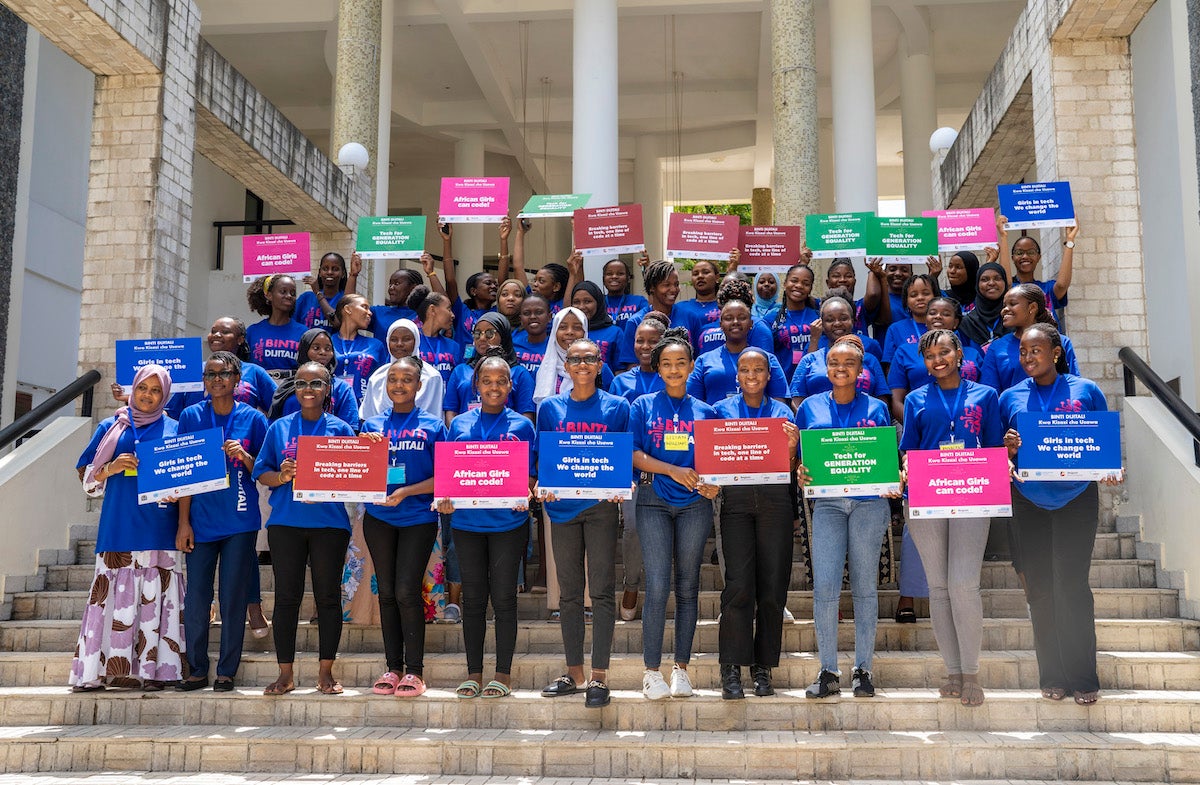
Call for applications to participate in Coding Camps under the African Girls Can Code Initiative (AGCCI) Phase III “Binti Dijitali”
Submission deadline: 15 November 2024

-
Context
Globally, women make up 28.4% of the workforce engaged in science, technology, engineering, and mathematics (STEM) and only 30% on average in sub-Saharan Africa. In addition, according to the Global Mobile Communication System (GSMA) Mobility Gap Report 2019, women in low- and middle-income countries are 10% less likely than men to own a mobile device and 23% less likely to use the Internet, compared to their male counterparts. In addition, in Africa,[1][2] the proportion of women using the Internet is 24% compared to 35% of men. [3] Lower levels of ownership and use of mobile devices by women not only reflect existing gender inequalities, but also threaten to exacerbate them. If the gender gap is not closed, women risk being left behind as societies and economies become more digital. Affordability, literacy, patriarchy and digital skills, perceived lack of relevance, and safety and security concerns are the most common barriers to women's access to and use of mobile internet.
Closing this digital gender gap requires a seismic approach to skills building and empowerment. Initiatives focusing on increasing participation in the digital economy and supporting the development of relevant content, applications, and services by and for women should be a priority. There is a need for a strong generational gender perspective on the digital divide if we are to achieve meaningful and lasting change for a digital revolution by and with girls in line with African Union's Agenda 2063, the upcoming million pound initiative, the AU Strategy for Gender Equality and Women's Empowerment and the Global Agenda 2030 (SDGs).
-
African Girls Can Code Initiative (AGCCI)
The African Girls' Code Initiative (AGCCI) was commissioned by UN Women, the African Union Commission (AUC) and the International Telecommunication Union (ITU). The AUC, through the AU Department of Health, Humanitarian Affairs and Social Development (HHSD), the Directorate of Women, Gender, and Youth (WGYD) and the Department of Education, Science, Technology and Innovation (ESTI), is providing technical support to this initiative. The aim is to train and empower a minimum of 2000 girls aged 17 to 25 across
Africa to become computer programmers, creators, and designers, putting them on the right track to undertake studies and pursue careers in the information, communication and technology (ICT) sectors. The initiative has two key strategies, namely: coding camps and the integration of ICT, coding, and gender into national curricula.
The first phase funded by the Government of Denmark was carried out between April 2018 and December 2019 and yielded good results. A second phase funded by the Government of Belgium was carried out from April to December 2023. A third phase was launched in June 2024 in Nairobi, Kenya by UN Women and its partners (AUC, ITU, ECA, UNESCO) with financial support from the Government of Belgium to ensure African girls benefit and contribute to the technological revolution in their countries and the continent.
UN Women Tanzania is launching a call for applications from qualified girls to participate in the first coding camp, which will be held in mainland Tanzania in December 2024 and in Zanzibar in March 2025.
The coding camps are coordinated in close collaboration with United Republic of Tanzania (Mainland and Zanzibar) through the:
- Ministry of Community Development, Gender, Women and Special Groups
- Ministry of Information, Communication, and Information Technology
- Ministry of Education, Science and Technology
Selection Criteria
To qualify for the coding camps, applicants should:
- Be a Tanzanian National, female, and between the ages of 17-25 years.
- Have an interest in science, technology, mathematics, ICT, and related subjects.
- Know how to use a computer and have basic knowledge of Computer Science.
Acceptance Criteria
- Provide written permission from parents or legal guardians (for girls under the age of 18) to attend the coding camp. This must be done in the application form.
- Provide a valid phone number and email address.
- Provide a letter of submission with confirmation of availability over the duration of the training (the training camp is 10 days).
- Agree to become an AGCCI Ambassador by sharing ideas and experiences in your school or community.
The Tanzania team responsible for implementing the African Girls Can CODE initiative will provide selected participants with the following:
- A 10-day training on coding as per the AGCCI manual
- Training materials
- Stationeries
- Transport to and from the training venue in both Zanzibar and Tanzania Mainland
- Laptops for use for the duration of and after the training.
Submission
- The Call for Application will be open until 15th November 2024 at 23.59 hrs (EAT) (Tanzanian Time).
- The application form is available here: APPLICATION FORM
- Only those short-listed will be contacted for further screening and consideration.
- Applications received after the deadline will not be considered.
- For more information please contact: tanzania@unwomen.org
Documents
Contact information
- Email: agcci.tanzania[at]unwomen.org